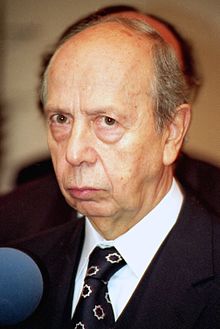Lamberto Dini
| Lamberto Dini | |
|---|---|
 |
|
| 51st Prime Minister of Italy | |
|
In office 17 January 1995 – 17 May 1996 |
|
| President | Oscar Luigi Scalfaro |
| Preceded by | Silvio Berlusconi |
| Succeeded by | Romano Prodi |
| Minister of Foreign Affairs | |
|
In office 17 May 1996 – 6 June 2001 |
|
| Prime Minister |
Romano Prodi Massimo D'Alema Giuliano Amato |
| Preceded by | Susanna Agnelli |
| Succeeded by | Giuliano Amato |
| Minister of Justice | |
|
In office 19 October 1995 – 16 February 1996 |
|
| Prime Minister | Himself |
| Preceded by | Filippo Mancuso |
| Succeeded by | Vincenzo Caianiello |
| Minister of the Treasury | |
|
In office 10 May 1994 – 17 May 1996 |
|
| Prime Minister |
Silvio Berlusconi Himself |
| Preceded by | Piero Barucci |
| Succeeded by | Carlo Azeglio Ciampi |
| Director General of the Bank of Italy | |
|
In office 8 October 1979 – 11 May 1994 |
|
| Deputy | Mario Sarcinelli Alfredo Persiani Acerbo Cannelo Oteri Antonio Fazio Tommaso Padoa-Schioppa Vincenzo Desario |
| Preceded by | Carlo Azeglio Ciampi |
| Succeeded by | Vincenzo Desario |
| Personal details | |
| Born |
1 March 1931 Florence, Tuscany, Italy |
| Nationality | Italian |
| Political party |
Italian Renewal (1996–2002) The Daisy (2002–2007) Liberal Democrats (2007–2009) The People of Freedom (2009–2013) |
| Spouse(s) | Donatella Pasquali Zingone |
| Residence | Rome, Lazio, Italy |
| Alma mater |
University of Florence University of Minnesota University of Michigan |
| Profession | Economist |
| Religion | Roman Catholic |
![]() Lamberto Dini (born 1 March 1931) is an Italian politician and economist. He was the 51st Prime Minister of Italy from 1995 to 1996 and Foreign Minister from 1996 to 2001.
Lamberto Dini (born 1 March 1931) is an Italian politician and economist. He was the 51st Prime Minister of Italy from 1995 to 1996 and Foreign Minister from 1996 to 2001.
After studying Economics in his native city of Florence, Dini took up a post at the International Monetary Fund in 1959, where he worked his way up until he served as Executive Director for Italy, Greece, Portugal and Malta between 1976 and 1979. Then, in October 1979, he moved to the Banca d'Italia, where he served as executive until May 1994. When the Governor of the Bank of Italy, Carlo Azeglio Ciampi, with whom Dini had developed a rivalry, was called upon to serve as Prime Minister in April 1993, Dini was widely tipped to succeed him, but was passed over (allegedly on Ciampi's instigation) in favour of Antonio Fazio.
Dini scored a comeback, though, when Silvio Berlusconi formed the Berlusconi I Cabinet in May 1994, in which Dini served as Treasury Minister. Due to a split between Berlusconi and his coalition partner Umberto Bossi, the Lega Nord leader, Berlusconi's government collapsed in December 1994, after a mere seven months in power. In January 1995, Dini was appointed as Prime Minister by President Oscar Luigi Scalfaro. Dini also took the portfolio for treasury in the cabinet and was a non-elected prime minister and minister. Though he was not noted as a left-winger, he was given the confidence vote of the left-wing parties (apart from the Communist Refoundation) and by Lega Nord, whereas his erstwhile partners in the right-wing government chose to abstain whilst citing benevolence. His cabinet was a technocratic one.
...
Wikipedia
